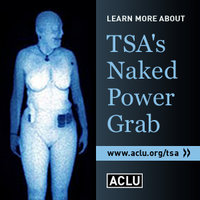
Today, the inspector general for the Department of Homeland Security (DHS) (PDF), and really, the title says it all. Called "Transportation Security Administration's Management of Its Screening Workforce Training Program Can Be Improved," the report finds it took years to get the current passenger screening program off the ground. And when it finally did, let's just say proper TSA screener training was not the emphasis. Well, there's a shocker to anyone who's been reading the news about the TSA lately.
Some gems from the report:
- "The agency does not have documented standard processes to update training based on current information, such as the results of officer testing." (Page 3)
- "The agency also has not documented procedures to determine or allocate the equipment, support, and time needed for the workforce to complete training requirements, and provides little centralized oversight of the training program." (Page 3)
- "TSA did not establish a lead office to organize and coordinate [Transportation Security Officer] training until 2006. At that time, TSA issued Management Directive 1900.8, Transportation Security Officer Training and Initial Certification Programs, designating the Operational and Technical Training (OTT) Division within the Office of Security Operations as responsible for the overall management of the analysis, design, development, and implementation of all TSO training programs. However, the OTT Division did not assume an active leadership role until 2009." [law was passed in 2001]. (Page 3)
- "According to a division official, OTT uses intelligence information, Aviation Security Assessment Program test results, covert testing results, and standard operating procedure changes to modify training, but it did not have a written procedure describing how to determine whether a training course needs to be modified." (Page 4)
- "Based on our interviews with TSOs and management personnel at the airports visited, TSA may not always provide TSOs with the equipment and support they need to effectively complete required training." (Page 5)
- "TSOs must complete both new hire and recurrent training on screening technologies; however, airport training equipment is sometimes different from the devices used at screening checkpoints. … TSOs were still training with x-ray images from older generation equipment, which limits their ability to identify prohibited items using the current checkpoint equipment." (Page 7)
- And "TSA does not ensure that TSOs are provided the time they need to effectively complete training requirements." (Page 7)
- "One lead TSO indicated that he had not accessed the Online Learning Center since 2005. The TSO also explained that staff had limited time to read printed training materials in lieu of going online. Therefore, the staff is encouraged to simply sign off on the materials and receive credit for taking the courses without providing evidence of reading or understanding the information. The Federal Security Director at this airport acknowledged these practices and said that he had been encouraging the Training Manager to have the TSOs use the Online Learning Center. (Page 8, emphasis ours)
On Monday, members of the New Jersey Assembly held a calling on the TSA to reconsider its screening procedures, calling them a violation of state and federal law. Republican
The pursuit of security should not force Americans to surrender their civil liberties or basic human dignity at a TSA checkpoint. Subjecting law-abiding American citizens to naked body scans and full body pat downs is intolerable, humiliating, vulnerable to abuse, and is fast becoming a disincentive to travel.
With the holiday travel season fast approaching, we hope TSA makes training its officers a top priority. But we want you be prepared when you get to the airport and have to make a choice between a virtual strip-search and a really aggressive grope. Visit our info page to find out more about TSA travel abuses, and .
If you've been forced through an AIT or want to report abuse during airport passenger screening, . We're collecting individuals' stories in order to determine the scope of this problem and evaluate future action. The information you provide in this questionnaire will be kept confidential unless we contact you and obtain your permission to share it with others.
Related Posts:

